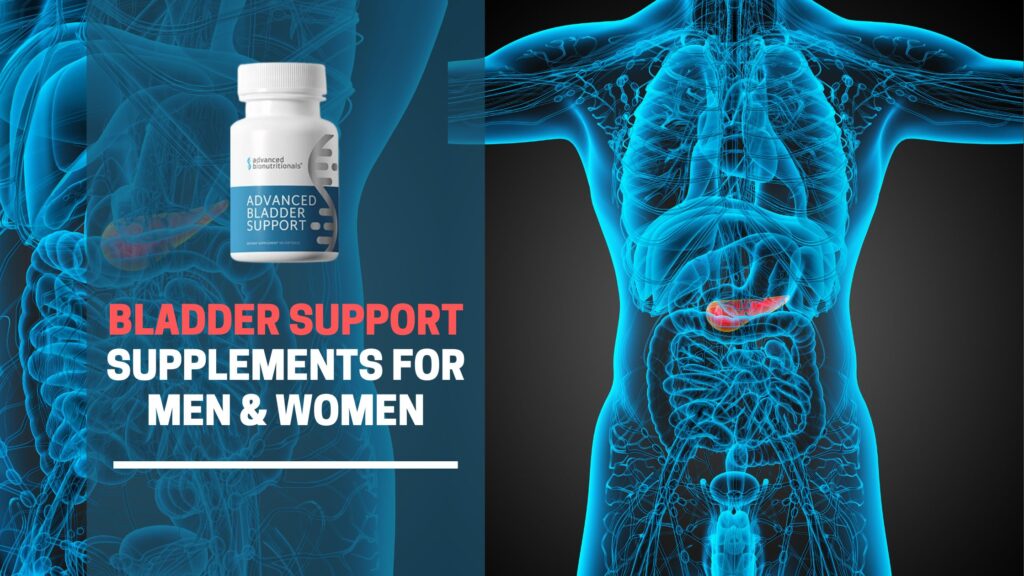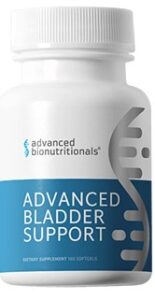Bladder support supplements for men & women
Several supplements are marketed as being beneficial for supporting bladder health in both men and women. These supplements may contain a variety of ingredients, including herbs, vitamins, and minerals. Some examples of ingredients that may be found in bladder support supplements include:
- Cranberry: Some research suggests that cranberry may help prevent bladder infections by inhibiting the growth of certain types of bacteria growth.
- Quercetin: This is a flavonoid found in various fruits and vegetables, and it has been shown to have anti-inflammatory and antioxidant properties. It may help to reduce bladder inflammation and improve bladder function.
- Piperine: This is an extract from black pepper that has been shown to have anti-inflammatory and antioxidant properties. It may help to reduce bladder inflammation and improve bladder function.
- D-mannose: This is a type of sugar that is found in some fruits, and it has been shown to help prevent bladder infections by inhibiting the growth of certain types of bacteria.
It’s important to note that the effectiveness of these supplements for supporting bladder health or function has not been definitively established, and more research is needed. It’s also important to talk to your doctor before taking any supplement, as they may interact with the medications you are taking or have other potential side effects.
Here are seven tips that may help improve urinary control
- Stay hydrated: Drinking plenty of water can help flush bacteria out of the urinary tract and prevent bladder infections. It can also help reduce constipation, which can put pressure on the bladder and cause incontinence.
- Exercise your pelvic floor muscles: Strengthening your pelvic floor muscles can help improve bladder control. Kegel exercises, in which you repeatedly contract and relax these muscles, are one way to do this.
- Manage your weight: Being overweight or obese can put extra pressure on the bladder, leading to incontinence. Losing weight through a healthy diet and exercise can help improve bladder control.
- Avoid bladder irritants: Certain foods and drinks, such as caffeine, alcohol, and spicy foods, can irritate the bladder and worsen incontinence. Limiting your intake of these substances may help improve bladder control.
- Use the bathroom regularly: Going to the bathroom on a regular schedule, rather than holding it in, can help prevent accidents.
- Avoid constipation: Constipation can put pressure on the bladder and cause incontinence. To prevent constipation, eat a high-fiber diet, drink plenty of water, and get regular exercise.
- Talk to your doctor: If you are experiencing ongoing problems with urinary control, it’s important to speak with your doctor. They can help identify the cause of the problem and suggest treatment options.
What is the purpose of the gallbladder?
The gallbladder is a small, pear-shaped organ located just below the liver. Its primary function is to store and release bile, which is a digestive fluid produced by the liver. Bile helps to break down fats in the small intestine, aiding in the digestion and absorption of fats and fat-soluble vitamins.
When we eat, the gallbladder releases bile into the small intestine through a series of ducts. The bile mixes with food as it passes through the small intestine, breaking down the fats and helping the body absorb them.
In some people, the gallbladder may not function properly, resulting in a condition called gallbladder disease. This can cause symptoms such as abdominal pain, nausea, and vomiting. In severe cases, the gallbladder may need to be removed surgically.
Which foods help to maintain a healthy bladder and kidneys?
Several foods may help support healthy bladder and kidney function:
- Water: Drinking plenty of water can help flush out toxins from the bladder and kidneys and maintain proper hydration.
- Berries: Berries, especially cranberries, have compounds that can help prevent urinary tract infections (UTIs).
- Leafy greens: Leafy greens, such as spinach and kale, are high in antioxidants and can help reduce inflammation in the bladder and kidneys.
- Nuts and seeds: Nuts and seeds, such as almonds and flaxseeds, are high in fiber and can help flush out toxins from the body.
- Citrus fruits: Citrus fruits, such as oranges and lemons, are high in vitamin C, which can help increase the acidity of urine and inhibit the growth of bacteria.
- Fish: Fish, such as salmon and tuna, are high in omega-3 fatty acids, which can help reduce inflammation in the bladder and kidneys.
It’s important to eat a balanced diet that includes a variety of fruits, vegetables, and other healthy foods to support overall health. It’s also important to speak with a healthcare professional before making any changes to your diet.
What are some of the most important vitamins for bladder health?
Several vitamins are important for maintaining healthy bladder function:
- Vitamin C: Vitamin C is a powerful antioxidant that can help to reduce inflammation in the bladder and urinary tract. It can also help to boost the immune system, which is important for maintaining overall bladder health.
- Vitamin D: Vitamin D is important for maintaining healthy muscles, including those in the bladder and urinary tract. It may also help to reduce the risk of developing bladder cancer.
- Vitamin E: Vitamin E is another antioxidant that can help to reduce inflammation in the bladder and urinary tract. It may also help to protect against oxidative stress, which can damage bladder tissue.
- B vitamins: B vitamins, such as vitamin B6 and vitamin B12, are important for maintaining healthy bladder function. They may help to reduce the risk of developing urinary tract infections, and may also help to reduce the severity of bladder symptoms in people with conditions such as interstitial cystitis.
- Vitamin A: Vitamin A is important for maintaining healthy tissues in the body, including those in the bladder and urinary tract. It may also help to reduce the risk of developing bladder cancer.
It’s important to note that while these vitamins may be beneficial for bladder health, it’s important to get them from a balanced diet rather than supplements. Speaking with a healthcare provider before starting any new supplement regimen is important.
More about Advanced Bladder Support Supplement
Bladder support is a common concern for many people, especially as they age. The bladder is a muscular organ that stores urine until it is ready to be expelled from the body. Over time, the muscles in the bladder can weaken, leading to a variety of issues such as incontinence, frequent urination, and difficulty fully emptying the bladder.
Advanced Bionutritionals offers a range of products designed to support healthy bladder function. These products are formulated with a blend of natural ingredients, including herbs, vitamins, and minerals, that have been shown to support bladder health.
One of the key ingredients in Advanced Bionutritionals’ bladder support products is pumpkin seed extract. Pumpkin seeds are rich in antioxidants and have been shown to support the health of the urinary tract. They are also a good source of zinc, which is important for the proper functioning of the prostate gland.
Another key ingredient in Advanced Bionutritionals’ bladder support products is cranberry extract. Cranberries have long been used to support urinary tract health due to their high levels of antioxidants and compounds that help to flush bacteria from the urinary tract.
In addition to pumpkin seed and cranberry extract, Advanced Bionutritionals’ bladder support products also contain a blend of herbs such as uva ursi, buchu, and corn silk. These herbs have traditionally been used to support the bladder and urinary tract health and may help to reduce the frequency of urination and improve bladder control.
Advanced Bionutritionals’ bladder support products are easy to take and are available in a variety of forms, including capsules, tablets, and liquid forms. They are designed to be taken daily to support ongoing bladder health.
If you are experiencing issues with your bladder or are looking to support healthy bladder function, consider trying a product from Advanced Bionutritionals. With a blend of natural ingredients and a commitment to quality, Advanced Bionutritionals’ bladder support products may be just what you need to maintain healthy bladder function.
Bladder support supplement ingredients
This cutting-edge bladder supplement provides you with nutrients and botanicals to support healthy bladder function & bladder health. Including:
#1: Chondroitin Sulfate – a mucopolysaccharide, has been shown in studies to help support the mucous lining of the bladder.
#2: Glucosamine Hydrochloride – to nourish the connective tissue that binds the mucous lining to the bladder muscle.
#3: Isoquercetin – this flavonoid has been shown to promote the proper inflammatory response. Thisoformorm provides better bioavailability of this nutrient to support healthy bladder function.
#4: Rutin – also a flavonoid and antioxidant, rutin has been shown to promote a healthy inflammatory response.
#5: Sodium Hyaluronate – a non-sulfated mucopolysaccharide, has been shown in studies to help support the mucous lining of the bladder.
#6: Marshmallow root – this herb has been shown to promote proper inflammatory response to support a healthy bladder.
#7: Extra Virgin Olive Oil – has compounds such as oleuropein, which are also shown to promote a healthy inflammatory response.
Advanced Bladder Support is manufactured in the USA from globally sourced ingredients by Soft Gel Technologies, Inc.
Join all the people that use this bladder supplement to support a healthy bladder as they age.
What is the best natural supplement for bladder control in men and women?
There is limited scientific evidence to support the use of specific natural supplements for improving bladder control in men. It’s important to speak with a healthcare provider before starting any new supplement regimen, as some supplements may interact with medications or have potential side several lifestyle changes may
There are several lifestyle changes that may help improve bladder control in men, including:
- Pelvic floor muscle exercises: These exercises, also known as Kegel exercises, can help to strengthen the muscles that control the bladder and improve bladder control.
- Maintaining a healthy weight: Being overweight or obese may increase the risk of developing urinary incontinence. Losing weight through a combination of diet and exercise may help to improve bladder control.
- Avoiding bladder irritants: Certain foods and drinks, such as caffeine, alcohol, and spicy foods, can irritate the bladder and worsen incontinence. Limiting or avoiding these irritants may help to improve bladder control.
- Staying hydrated: Drinking enough water can help to flush out the urinary tract and reduce the risk of urinary tract infections, which can contribute to incontinence.
- Quitting smoking: Smoking may increase the risk of developing urinary incontinence. Quitting smoking may help to reduce the risk of developing incontinence and improve overall bladder health.
It’s also important to see a healthcare provider if you are experiencing symptoms of bladder control problems, as there may be underlying medical conditions that need to be treated.
How can men stop frequent urination naturally?
Frequent urination can be a symptom of various medical conditions, such as urinary tract infection, enlarged prostate, or diabetes. It’s important to see a healthcare provider if you are experiencing frequent urination, as they can determine the cause and recommend the appropriate treatment.
In some cases, making lifestyle changes may help to reduce the frequency of urination. Some options to consider include:
- Limiting fluid intake: Reducing the number of fluids you drink, especially in the evening, may help to reduce the frequency of urination. It’s important to maintain adequate hydration, however, so be sure to speak with a healthcare provider about the appropriate amount of fluids for you.
- Limiting bladder irritants: Certain foods and drinks, such as caffeine, alcohol, and spicy foods, can irritate the bladder and worsen frequent urination. Limiting or avoiding these irritants may help to reduce the frequency of urination.
- Maintaining a healthy weight: Being overweight or obese may increase the risk of developing urinary incontinence and frequent urination. Losing weight through a combination of diet and exercise may help to reduce the frequency of urination.
- Quitting smoking: Smoking may increase the risk of developing urinary incontinence and frequent urination. Quitting smoking may help to reduce the risk of developing these symptoms and improve overall bladder health.
- Pelvic floor muscle exercises: These exercises, also known as Kegel exercises, can help to strengthen the muscles that control the bladder and improve bladder control.
It’s also important to see a healthcare provider if you are experiencing symptoms of frequent urination, as there may be underlying medical conditions that need to be treated.





